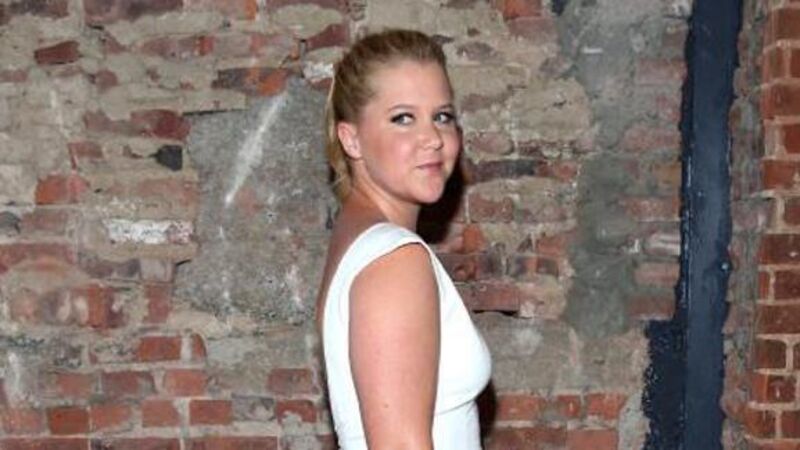Why we can’t get enough of Amy Schumer

Almost as soon as she started her Comedy Central series, the comedian Amy Schumer thought up a sketch: What if there was a single day on which an ageing actress’s desirability evaporates?
“We just liked the idea that there’s this calendar: This is it, you’re not ... lust-worthy anymore,” Schumer says, using bluer language, the kind she has become known for on the show, Inside Amy Schumer.
Her producers were enthusiastic but couldn’t get the bit off the ground.
“We tried to get it made for three years,” Schumer says. “And actresses all said no.”
Still, the team didn’t give up, continually rewriting the sketch.
“That was like the white whale,” says Kim Caramele, Schumer’s sister, a writer and producer of the show.
Then, a few months ago, their dream cast signed on. The sketch, which aired in April, starred Tina Fey, Julia Louis-Dreyfus, and Patricia Arquette as themselves, toasting Louis-Dreyfus’s last day of sex appeal.
“Believe me, no one was more surprised than me” that it came so late, she says in the scene.
“The fact that it continued into my 50s? I thought that US Weekly had made some sort of a clerical error.”
The piece was a viral hit — over 3m views on YouTube; almost as many thinkpieces — and a reflection of Schumer’s new clout and a culture suddenly, emphatically ready for her spiny message.
By giving selfies and boy bands the same political and comic weight as rape and reproductive rights, Schumer, 34, has emerged as a feminist hero, able to transform from the butt of her own jokes to a savvy debunker of double standards.
Equal parts naughty cheerleader, self-deprecating Everywoman, and fearless truth-teller, Schumer connects with women and men alike, all while she lampoons them and the media’s lopsided portrayals.
To Michele Schreiber, who teaches film and media at Emory University, Schumer’s comedy is “perfectly suited to a changing cultural landscape in which the word ‘feminism’ is slowly losing its negative connotations”, she says, adding that Schumer “dispels the most persistent point about feminists, which is that feminists can’t take a joke”.
But striking a balance between political and funny is still “very, very challenging,” she adds.
That Schumer pulls it off “makes her kind of sneakily, incredibly powerful”.
Schumer’s mainstream appeal will be tested with her feature debut, Trainwreck, directed by Judd Apatow, which she wrote and stars in, as a successful magazine writer who has no trouble getting men in bed but less interest in having them stick around afterward.
It’s her biggest project yet, and at a moment when many stars would be playing it safe, she is doing the opposite: making out with Fey at the Peabody Awards; vamping unscripted — and dirty — at a Glamour magazine ceremony; and responding to an accusation of racism, first bluntly and then with nuance, all in the service of her unflagging vision.
“I know that I have a lot to say,” Schumer says.
“And I have really good intentions. And people are digging it and responding, so I’m waving everybody in like the third-base coach, like, ‘yes, yes, c’mon.’”
Or as Apatow put it, “Sometimes people have their moment, and they’re ready to do the work.”
A road-tested comedian for 11 years, Schumer has already put in a lot of work. Brought up in Manhattan and Long Island, “she’s always wanted to make up plays and characters and dances”, says Caramele, her younger sister.
“My whole life, I felt like people wanted the girls to be a little quieter,” Schumer says, an attitude she rejected early.
(“We were always raised to believe that we have worth and should express ourselves,” her sister adds later. They also have an older brother, Jason Stein, a jazz musician.)
As her family went through a turbulent period — a divorce, a bankruptcy, a diagnosis of multiple sclerosis for her father — Schumer turned to comedy as an escape.
She earned a theatre degree at Towson University in Maryland, where her feminism deepened.
“I’ve always been hos before bros,” she says. “Madame Bovary, I felt for her, the injustice. After I read A Doll’s House, I was like, well, all is lost.”
Back in New York after college, she studied the Meisner acting technique, bartended, and began to develop her persona. As a leggy blonde with an athletic background — she played volleyball in college — “I just don’t look like I’m going to be funny,” she says.
Bouncing off that type, she found a rapport with audiences, especially when it came to talking, in uninhibited, juicy detail, about libido.
“I thought, oh my God, I don’t think I ever saw a female comic talk about sex like this,” she says. “I was like, I’ll be that voice.”
Club bookers and network executives discouraged her — “People would say, ‘it’s a lot about sex’” — but she persevered.
“Have you had a sexual experience that wasn’t, on some level, hilarious?” she says.
“Maybe five times in my whole life. It’s so fun to be honest about that stuff.” (A discussion of whether it’s all right to masturbate in front of your pets followed. Consensus: Yes, but cats are better than dogs.)
While Schumer was finding her rhythm (gaining fans as a contestant on Last Comic Standing in 2007), a female-comedy movement was unfolding, led by Fey, Kristen Wiig, and Amy Poehler, first on Saturday Night Live, then with their own sitcoms and films.
They were building on the careers of ribald comics like Margaret Cho, Sarah Silverman, and Roseanne Barr (themselves inspired by groundbreakers like Joan Rivers).
In the ’90s, “television comedy was really very secular”, Cho says.
“It was OK for men to be sexual, but women were encouraged to not have that sort of earthiness.”
Cho reserves more provocative material for the smaller scale of clubs. “We didn’t have the tools to talk about it the way that Amy does now,” she says.
“When I was a teenager, we didn’t even have the term ‘date rape’. We didn’t have as many ways to communicate.”
As stars like Lena Dunham and Mindy Kaling arrived, boundaries loosened. Lately, “the public is receptive to a more biting and less idealised representation of women,” says Schreiber, the professor and author of American Postfeminist Cinema: Women, Romance and Contemporary Culture.

Feminism went mass, as popstars like Beyoncé and Taylor Swift declared their allegiance, and social media spurred empowerment conversations, all of which helped open the door for Schumer.
Fey has long resisted gendered cultural niches — “Women don’t exist only in relation to other women”, she says — and offered instead that “Amy is raising the bar for all comedians”.
“She’s ‘all the way’ funny,” she says. “That’s what is inarguable. You can try to say a subject is off limits or too strident, but if the jokes are funny, it’s funny. End of conversation.”
Fey says she agreed to participate in the last-day skit — known as LFD — because she was already a fan of the show.
“The sketch where Paul Giamatti plays God is one of my favourite things in the last 10 years,” she says. And the ageism premise “is extremely timely to me right now ’cause I just got served LFD. papers the last time I flew into LAX.”
Apatow took note of Schumer even before her TV series, when he caught her on Howard Stern’s show, talking about her family and relationships. “I thought, I want to see a movie about all this, and so I called her,” he says.

The result was Trainwreck, which parallels Schumer’s life — her character, named Amy, also has a married sister named Kim and a father with MS. And she wanted her alter ego to be sexually adventurous, without judgment.
On assignment, she falls for a sports medicine doctor (Bill Hader) whose best friend is LeBron James. As a screenwriter, Schumer overprepared, researching surgeries for Hader’s part and consulting journalists to flesh out her character.
Apatow was astounded by her work ethic.
“If I gave her notes, she would come back in like five, six days with a completely new draft,” he says, even as she juggled her series and stand-up dates. “I don’t know how she does it.”
Schumer’s creative life is orderly. She meets weekly with a theatre collective she co-founded eight years ago. Trainwreck was workshopped there, as are Inside Amy Schumer scripts, shepherded by the head writer, Jessi Klein, who also helped dream up the LFD scene.
Among Schumer’s most challenging scripts was the episode-long parody of the courtroom drama 12 Angry Men.
In this version, the all-male jurors debate, in lacerating terms, whether she is hot enough to have a TV show.
Schumer conceived the skit and wrote it by herself, “because I didn’t want it to be like, ‘writers, bring in things that you think are wrong with my face and body.’” It was still painful. “I was cooking up my own deepest insecurities,” she says.
Despite the episode’s being black-and-white, ratings stayed steady (the show usually draws under a million viewers).
And critics adored it; Lena Dunham called it “the most important thing that’s happened on TV in a long time”.
Schumer adds: “I feel pretty invincible now, in terms of appearance stuff.”
Trainwreck is released in Ireland on August 14.










